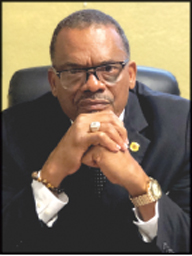A Message From The Publisher
By Bobby R. Henry, Sr.
As the political land-scape continues to divide, endorsements from high-profile figures can hold significant sway, shaping public perception and influencing voters. In recent weeks, an array of Black entertainers, professional athletes, and even controversial figures such as known drug dealers and sex offenders have come forward to endorse Donald Trump and J.D. Vance. While political endorsements from celebrities are nothing new, the troubling nature of these specific endorsements raises questions about the motivations behind them and their implications for our society.
The fascination of celebrity endorsements lies in their ability to mobilize followers who identify with the public figures’ achievements, cultural influence, or personal stories. When athletes and entertainers speak out in favor of a political candidate, it can feel like an extension of their on-screen, stage or on-field personas. However, it is crucial to remember that fame is not always a mirror of moral authority or political wisdom. The political perspectives of such figures should be evaluated critically.
Endorsements from individuals with histories of criminal activity, moral turpitude are especially concerning. It is essential to ask whether such figures should be given platforms influence public opinion, specifically when the issues they may endorse do not align with broader community values. In the case of Trump and Vance, this phenomenon appears to be a deliberate strategy to leverage the cultural influence of these personalities, regardless of their controversial histories. This can be seen as an exploitation of fame without regard to ethical considerations.
For some, Trump and Vance’s appeal may lie in their positioning as “outsiders” who are not afraid to break with conventional political norms. Their public speaking often summons a rejection of the establishment, resonating with individuals who feel disenchanted with traditional political leaders. However, the embrace of figures with questionable backgrounds reflects a troubling trend in which ethics are cast aside in favor of a superficial kind of cultural credibility.
The fact that prominent B lack entertainers and athletes have joined this wave of support for Trump and Vance adds another layer of complexity. Many in the Black community are rightfully concerned about policy issues such as criminal justice reform, economic opportunity, and police accountability—areas where the Trump administration’s record has been inconsistent or damaging. It is therefore perplexing to see endorsements that seem to contradict the interests of the very communities these celebrities often claim to represent.
Perhaps for some athletes, the reasoning behind their support can be attributed to factors other than sound judgment; maybe they’ve taken too many punches to the head, or perhaps their diva status on the field has been diminished by ignorance and lackluster abilities to perform. When a career of physical strain or fleeting fame wears thin, jumping into the political arena can seem like a desperate grasp for relevance rather than a considered choice rooted in a genuine understanding of policy issues.
This editorial is not intended to dismiss or demonize any individual who chooses to support a candidate for personal reasons, nor is it to claim that all celebrity endorsements are inherently harmful. However, it is necessary to scrutinize the motivations behind these endorsements and the extent to which they are aligned with the public good. When controversial figures become political spokespeople, it muddies the waters of discussion, shifting attention away from independent policy discussions to focus on personalities and spectacle.
Endorsements should be about more than just grabbing fleeting moments of attention. Voters deserve to hear how policies will affect their lives, families, and communities. The support of entertainers, athletes, and even reformed individuals with criminal backgrounds is not fundamentally problematic; it is the lack of a critical dialogue surrounding these endorsements that poses a danger. When fame is used to distract from or whitewash or in this case blackwash, questionable policies and divisive rhetoric, we should be alarmed.
As citizens, we must demand more from those who seek to sway public opinion. Celebrities, athletes, and other public figures have a right to participate in the political process, but with that right comes a responsibility to ensure their endorsements contribute positively to public discussion rather than diluting it. As we navigate this contentious election season, let us focus on the candidates’ policies and their real-world implications, not just on who stands beside them at the podium.

